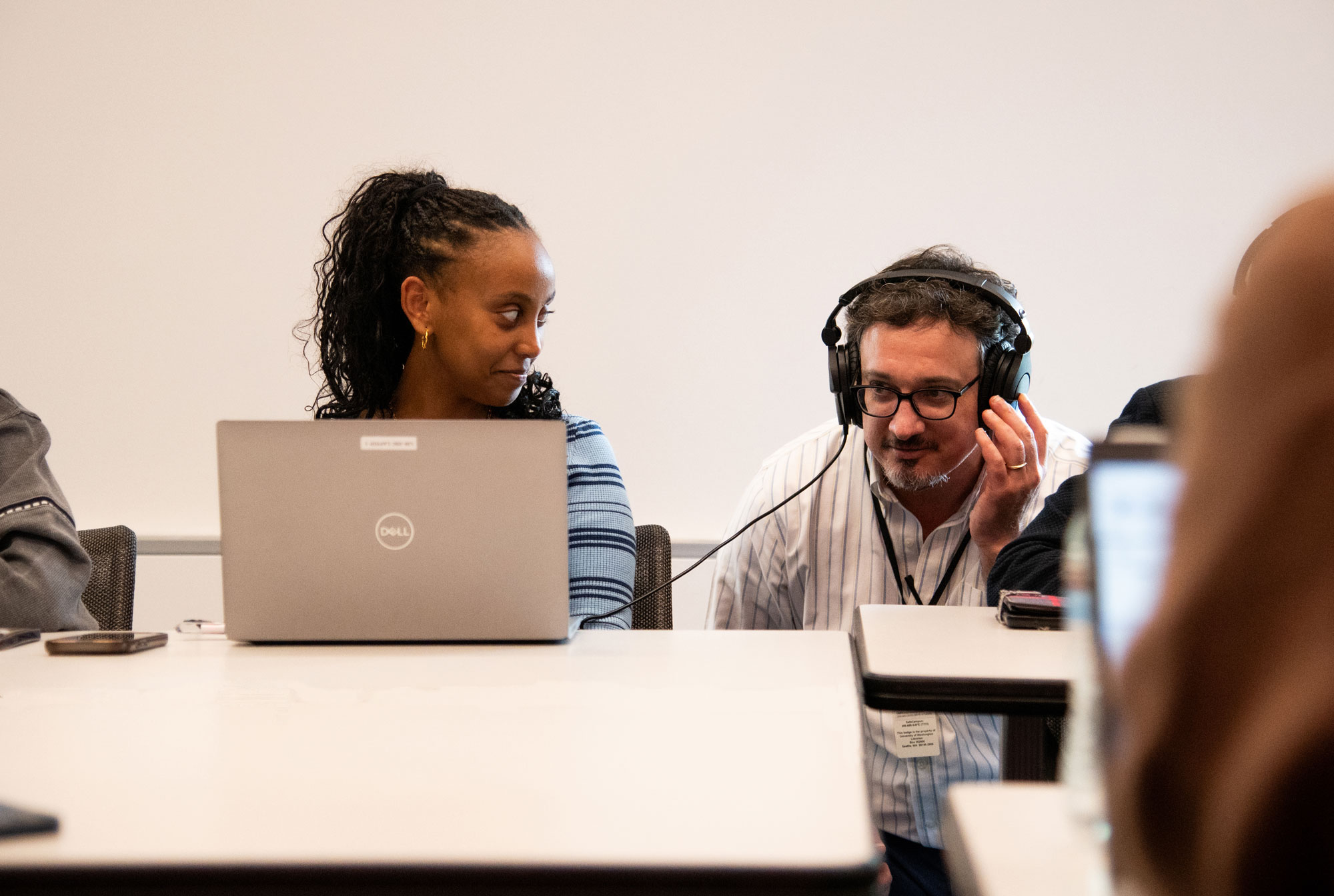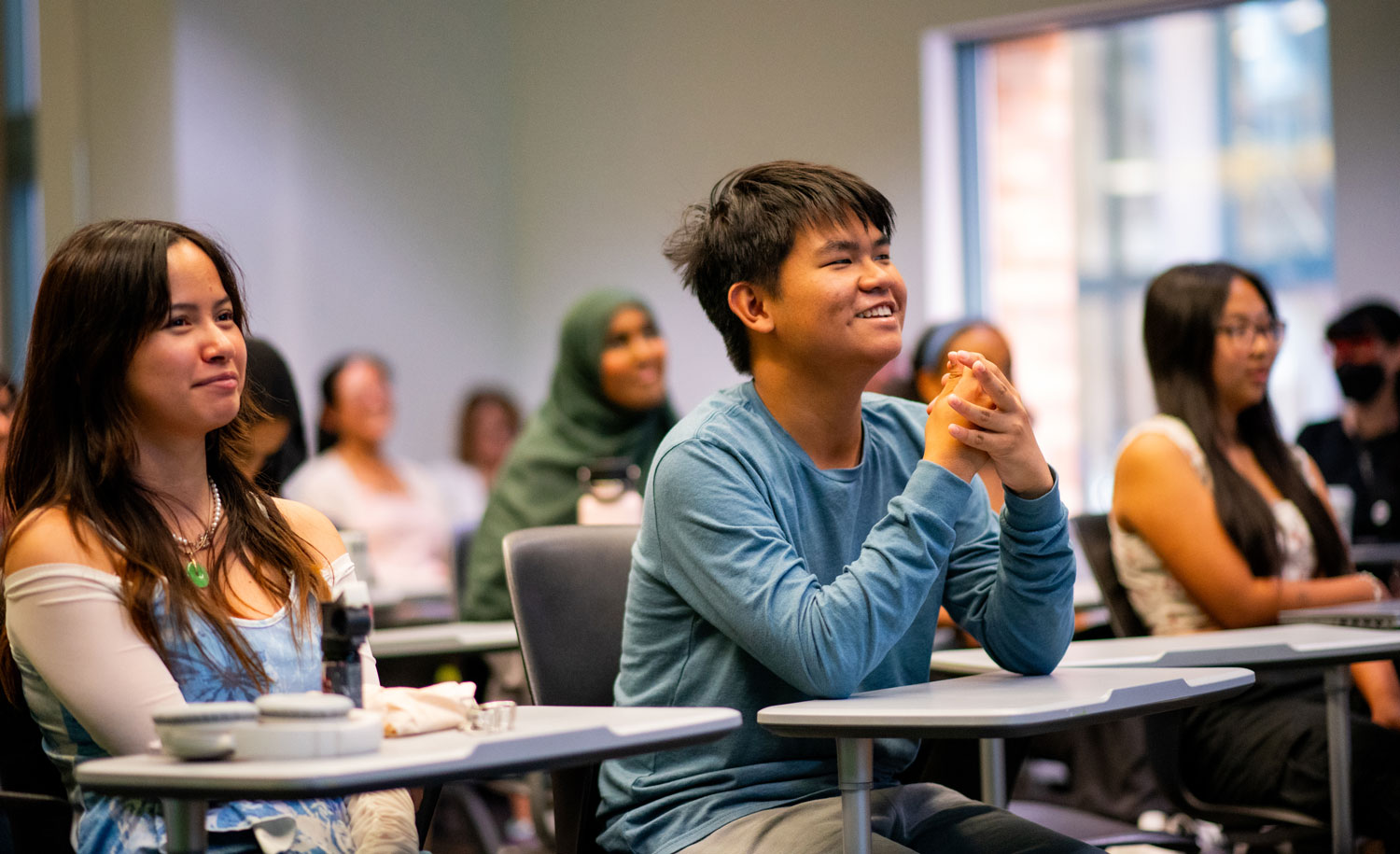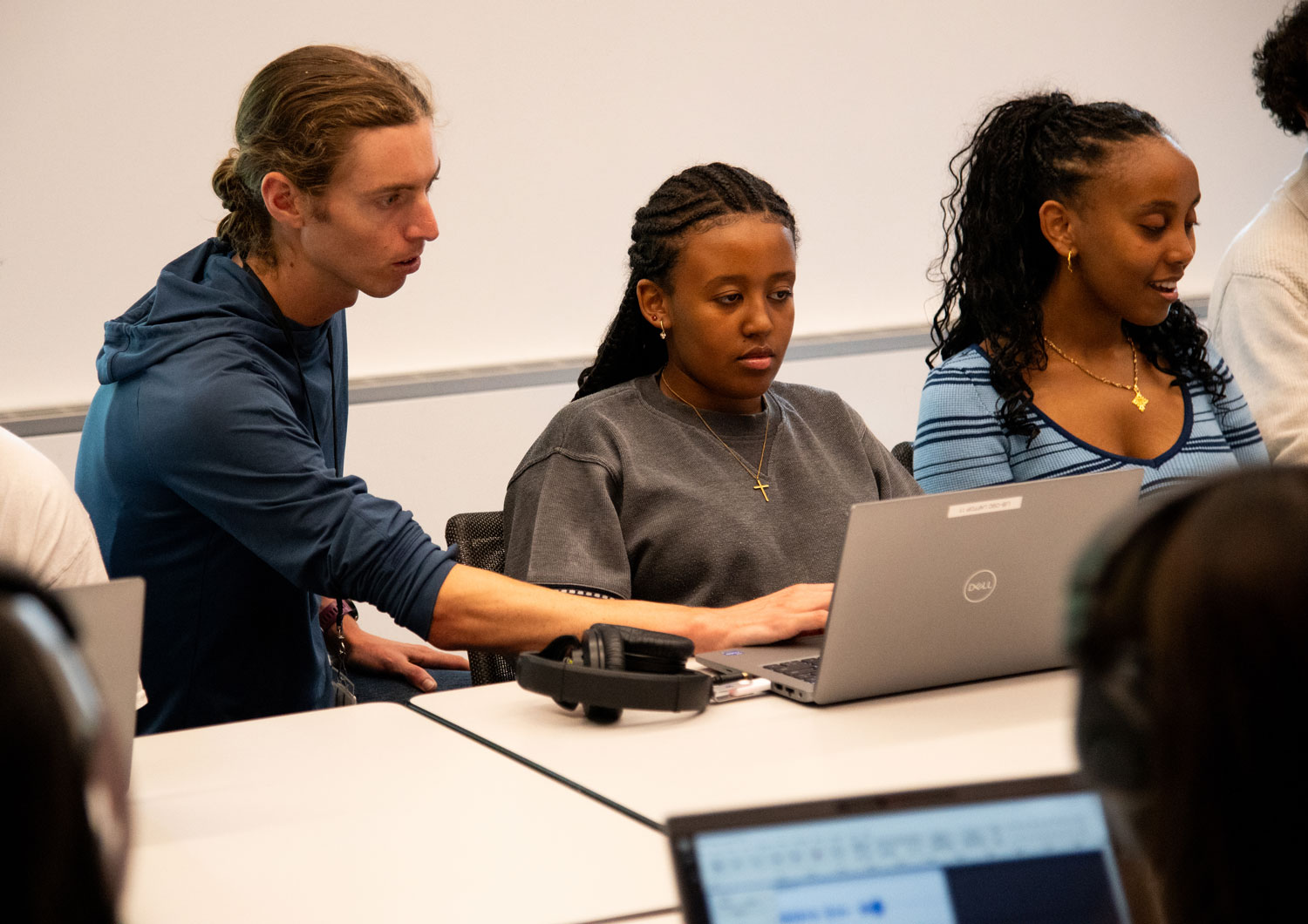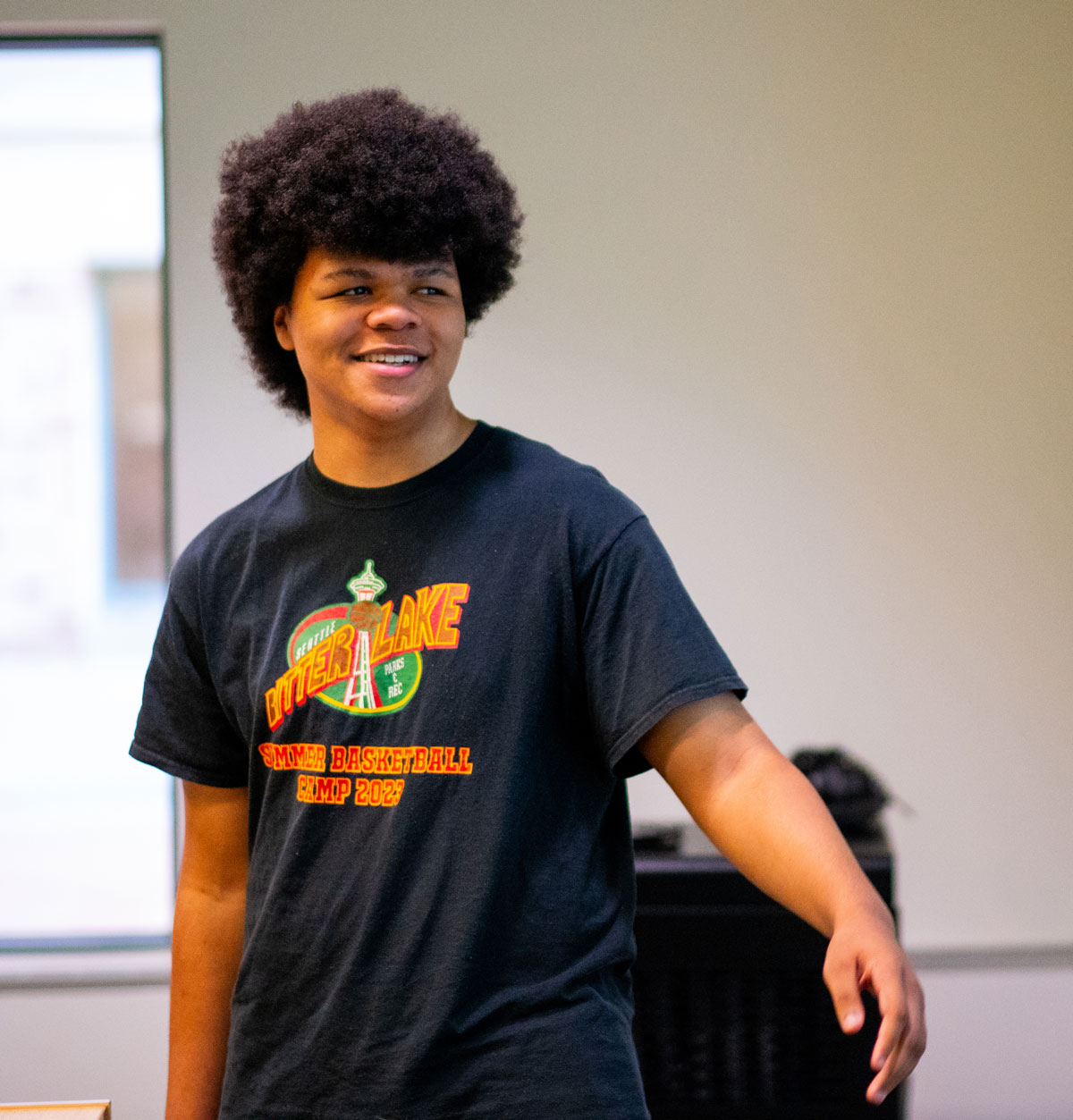A taste of the UW A taste of the UW A taste of the UW
A UW Libraries internship program gives high school students an idea of what it looks like to attend the UW, especially if they don't have family experience to lean on.

A UW Libraries internship program gives high school students an idea of what it looks like to attend the UW, especially if they don't have family experience to lean on.
Some of their stories were touching. In her podcast, Kaylyn described losing touch with her first language, Vietnamese, and taking classes to help her communicate better with her family. “The language barrier was so difficult that it made me feel unheard and left out of my father's life,” she shared.
Some were humorous, like Venkat’s tale of his business venture in the athletic shoe resale market, in which he spent days acquiring a pair of shoes for $190, finding a buyer and securing a tidy $130 profit. His takeaway: “I had spent more time staring at the prices and waiting for the shoe than owning it, and I didn’t regret that at all.”
And some were what you might expect from a group of high school students using digital storytelling and story maps to share their experiences. Lensa’s was about her favorite musical genres; Mandy’s was about restaurants around the world; Ayan and her podcast guests speculated about paranormal activity.
The teenagers spent two weeks visiting the UW in Seattle over the summer as part of the UW Libraries High School Internship program. Since 2017, UW librarians have brought in groups of high school students for mentorship and a crash course on college life. The students leave camp with new skills, multimedia stories to share and a better sense of how their futures might look.

Students Kaylyn (left) and Jim (center) enjoy a presentation from a fellow intern.
Lujain Al Zayid was one of those students in 2021. When she and her twin sister did the internship, college was on her radar, but she didn’t have a mental picture of what it would be like to attend one. She had just gotten through the pandemic school year at Seattle’s Nathan Hale High School and says the internship helped her make connections and put her on a path to the UW.
“One of the things that they do is show you what it’s like to be a student at the U,” Al Ziyad says. Even though the internship was online that year, the libraries brought in speakers who described student life and gave guidance on the admissions process.
As an intern, Al Ziyad created a podcast and built a map of the places she wants to visit in Jordan, where she lived until she was 9 years old. Now an intended Law, Societies & Justice major and a student worker with UW Libraries, Al Ziyad credits the internship with helping her submit a stronger application.
“The internship helped with what to really say and write about in your essay,” she says. “When I was applying, I kind of had an advantage because I knew what to expect.”
Like most of the interns, Al Zayid and her sister are the first in their family to attend college in the U.S. Expanding access to higher education is one of the primary goals for UW librarians Elliott Stevens and Kian Flynn, ’16, who co-lead the program.
“For a lot of kids, their dream school is U-Dub,” Stevens says. “We should be connecting to these students. A lot of them are first-gen college students. A lot of them are from groups historically underrepresented and excluded from higher education. We need this connection.”
* * *
Stevens and Flynn, who both have worked in high schools in the past, each bring their own expertise to the program. Stevens’s job as an English studies librarian includes leading graduate students in making podcasts, videos and digital books. Flynn is a geography and global studies librarian, and his job includes providing support for the use of story maps.
They help interns understand and apply those storytelling tools for self-expression. Whether it’s Haneen’s podcast “Hijabi Diaries” detailing the reasons Muslim women wear hijab or Halleluia’s story map noting underrated songs from her favorite artists like Kendrick Lamar and Ariana Grande, digital storytelling is an engaging way for the students to learn as they share something about their lives. At the end of the internship, they present their stories before a roomful of peers, librarians and invited guests.

A geography librarian, Kian Flynn, co-leader of the UW Libraries internship, helps students with story maps. Here, he works with Lensa and Helleluia.
Nancy Garrett, ’03, a teen services librarian at the Lake City branch of the Seattle Public Library, says the showcase never fails to blow her away.
“Students really bare a lot of their lives and their passions and their cultures,” Garrett says. “You can tell that they put a lot of work and thought and care into it. It’s just an environment where they rise.”
Garrett, whom Stevens calls “a legend,” was one of the first people he and Flynn contacted when the internship program was just an idea. They didn’t know how to reach teens who might want to be interns, and the UW Dream Project connected them to Garrett at the nearby library. She helped recruit the first cohort of interns and has worked with local agencies since then to promote the program to low-income residents.
The Seattle Public Library is a key partner in the program, helping to fund it for the past two years and providing a $630 stipend for interns. Garrett helps promote the internships, especially among teens who want to go to college but whose families don’t have personal experience to lean on. It’s gratifying to see them come out of the program with polished digital stories and newfound confidence about college, Garrett says.
“It’s always so inspiring, the projects that students come up with — everything from lighthearted and funny to the absolutely poignant and emotional and moving,” she says.
* * *

Deon, a Nathan Hale High School student, showed a short film at the culmination of his internship.
Deon, a sophomore at Nathan Hale High School, told stories from both ends of that spectrum during this year’s project showcase at the UW’s Allen Library and on Zoom. First, his short film recalled a frightening experience from a few years ago during the pandemic.
“Lockdown was going pretty good, until out of the blue, I got sick with what I thought was a fever,” he recounted in his audio-visual presentation. His weight dropped rapidly while waiting for doctors to figure out what was wrong. Months later, he was diagnosed with Crohn’s disease.
Now healthy and managing the disease with diet and medication, Deon followed up with his story map, which showed his favorite places to visit with family and friends. Among them were Great Wolf Lodge and Wild Waves, where he recalled his older sister cackling after she talked him into going on a scary ride. “I learned that day to never, ever go on a ride with my older sister,” he joked.
Deon, like all of the interns, was selected for one of just 10 spots in the program from a pool of well over 100 applicants. Most who are accepted are future first-generation college students from Seattle. In addition to nearby Nathan Hale, interns this year represented West Seattle, Rainier Beach, Cleveland, Franklin and Garfield High Schools. A couple interns hailed from North Creek High School and Mountlake Terrace High School in south Snohomish County.
The UW Libraries High School Internship program offers a rare opportunity. Stevens and Flynn know of only a couple other paid internships at academic libraries. The teens gain storytelling skills and insights from guest speakers, helping them get a leg up on their college applications. The whole experience, Flynn says, helps to demystify academic libraries, which can seem imposing for kids who are used to hanging out at their local public library.
“For students thinking that libraries are just books, it shows a side of the libraries that is more services-based than collections-based, which could be a hook for students that are more interested in being storyteller creators rather than storytelling consumers,” he says.
Some of the students get the bug to work in libraries as undergraduates, and the internship program has created a pipeline of student workers. Four of the UW Libraries’ seven undergrad student workers are former interns, and several others have worked there since the program began.
“The whole experience, Flynn says, helps to demystify academic libraries, which can seem imposing for kids who are used to hanging out at their local public library.”
Diana Quintero-Perez was one of those students. When she did the internship as a junior at Seattle’s Nathan Hale High School in 2018, college was on her radar, but as the first-born in a family without a college background, she was finding her way on her own.
She made that the focus of her digital story, a poem about doing things independently with the hope that she could use what she has learned to give back and help others. She says creating her story brought her out of her shell.
“It helped me be more comfortable with telling my story, because I usually don’t like sharing a lot or just even talking about myself,” she says.
The internship factored heavily into her decision to attend the UW because it made her feel she already had a support system in place there. She stayed in touch with Stevens and became a student assistant for two years with UW Libraries before graduating last spring with a degree in Education, Communities and Organizations.
Quintero-Perez now works at Fred Hutchinson Cancer Research Center as a research project interviewer, and she volunteers as a tutor at the Lake City library, where Garrett first told her about the UW Libraries internships.
“I got to meet so many people that were more than willing to help,” she says. “I always make sure that whatever programs I’ve been part of, I always give back and support the same.”